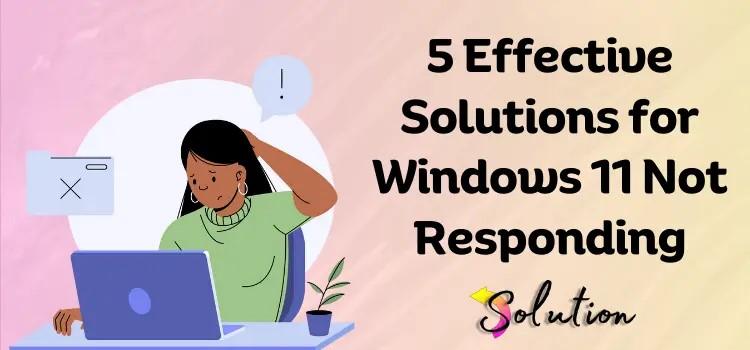Windows 11 offers a sleek design and improved performance, but like any operating system, it isn't immune to occasional freezes or unresponsiveness. If you've found yourself staring at a frozen screen, don’t worry—there are reliable fixes. Here are 5 Effective Solutions for Windows 11 Not Responding issue.
1. Restart Windows Explorer
When your desktop, taskbar, or File Explorer becomes unresponsive, restarting Windows Explorer can quickly bring your system back to life.
Steps:
-
Press
Ctrl + Shift + Escto open Task Manager. -
Find Windows Explorer under the “Processes” tab.
-
Right-click and select Restart.
This simple action often resolves temporary UI freezes without needing a full reboot.
2. Check for System Updates
Outdated system files can lead to performance glitches and freezes. Keeping Windows 11 updated ensures you have the latest fixes and security improvements.
Steps:
-
Go to Settings > Windows Update.
-
Click Check for updates and install any available patches.
After updating, restart your system and see if the problem persists.
3. Perform a Clean Boot
Sometimes third-party apps or services can interfere with Windows processes, causing it to become unresponsive. A clean boot loads Windows with only essential drivers and services.
Steps:
-
Press
Win + R, typemsconfig, and hit Enter. -
Go to the Services tab, check Hide all Microsoft services, and click Disable all.
-
Under the Startup tab, open Task Manager and disable all startup items.
-
Restart your PC.
If your system runs smoothly, you can identify the problematic service by re-enabling items one by one.
4. Run System File Checker (SFC)
Corrupt system files are a common reason for unresponsiveness in Windows 11. The built-in SFC tool can repair them.
Steps:
-
Open Command Prompt as administrator.
-
Type:
sfc /scannowand press Enter. -
Wait for the scan to complete and follow any prompts.
This process can take a few minutes but may fix underlying system issues.
5. Check for Hardware Issues
If none of the above methods work, the problem could be hardware-related—especially if your system freezes randomly.
Tips:
-
Run Windows Memory Diagnostic to check RAM.
-
Use CHKDSK to scan your hard drive:
Open Command Prompt as admin and run:chkdsk C: /f /r -
Make sure all cables and components are securely connected.
Consider running stress tests or visiting a technician if you suspect failing hardware.
Final Thoughts
Windows 11 not responding can be frustrating, but it doesn’t have to be a mystery. These five solutions target the most common causes and often resolve the issue without drastic measures. If problems persist, backing up your data and considering a clean install of Windows 11 may be your best long-term solution.


